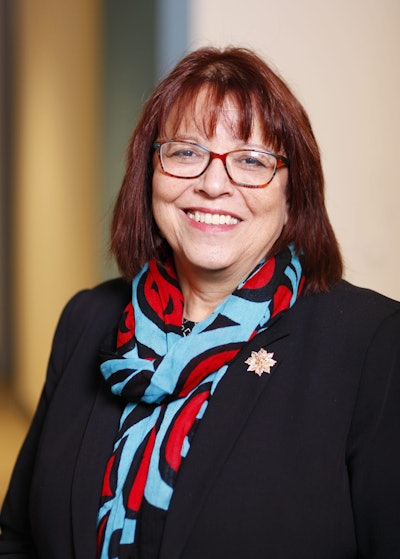As the COVID-19 pandemic persists, health disparities continue to be revealed and exacerbated.
The disproportionate impact is especially prevalent within Native American communities, where the infection rate is 3.5 times higher compared to White populations, according to the Centers for Disease Control (CDC).
 Dr. Cheryl Crazy Bull
Dr. Cheryl Crazy BullDr. Cheryl Crazy Bull, president and CEO of the American Indian College Fund, emphasized that Native communities are “impacted by death and the lack of access to health resources at this time.”
“I know lots of people who have died and I know a lot of people outside of our communities, they don’t necessarily experience that,” she added. “It is kind of abstract to them, but for us it is not. I think we have to be trauma informed. I think that is true of other communities of color and rural communities as well.”
To support tribal communities, AT&T donated $1.5 million worth of supplies such as hand sanitizer, gloves and disinfectant to the American Indian Higher Education Consortium (AIHEC) and American Indian College Fund.
“We are glad to play our part to help provide the critical resources Native communities need to survive the Covid-19 pandemic,” said Teresa Mask, a spokesperson at AT&T. “As tribal communities continue to face rising Covid-19 infection rates, it’s important they have the pandemic-related supplies they need to stay safe, such as gloves, disinfectant and hand sanitizers. There is still much more work to be done to ensure Native American communities have access to the resources needed to get through the COVID-19 pandemic and beyond.”
The organizations announced plans to allocate the supplies to more than 20 tribal colleges and universities (TCUs) across the United States.
“[The donation] is making a huge impact for not only the communities, the students, the tribal colleges but our administration and our budgets,” said Dan King, president of Red Lake Nation College. “It is really saving us and helping us at a time when we need it. We are very grateful.”
However, those institutions are not just distributing the supplies to staff, faculty, students and other employees. Families and other members of a TCU’s local community will also receive them.
“It is not an understatement to say that [this donation] is transformative and lifesaving, especially when you look at the impact that this pandemic has had on our community,” said Carrie Billy, president and CEO of AIHEC. “Everything helps.”
The financial impact of COVID-19 has also hit Native American communities. For example, the revenue from casinos on reservations often provides support to tribal operations. However, many have faced 30-40% cuts in revenue. As for TCUs, the pandemic has put pressure on budgets that were already running “on a shoestring” as students faced access issues inside and outside the classroom, according to King.
 Carrie Billy
Carrie BillyWith the transition to remote learning, many students were left without technology or Wi-Fi to complete course assignments. To address this issue, many institutions offered students laptops and hotspots.
Working from home also meant many students lacked quiet spaces to study.
The connection between students and faculty became lost in a virtual classroom setting. Additionally, the new environment also made it difficult for students to retain course information, according to Billy.
Other challenges faced by TCU students include food and housing security as well as access to mental health services.
Billy advised students to continually check in with one another and ask faculty members or the administration for assistance.
“I always ask people how they are doing, listen to them and have those conversations,” she said. “Use the supplies that AT&T is making available so that you can get together in a physically distant way and safe way.”
The federal government provided some financial support to TCUs and other minority-serving institutions (MSIs). For example, the Higher Education Emergency Relief under the Coronavirus Aid, Relief and Economic Security Act (CARES Act) provided MSIs with $1.4 billion in funding, according to the U.S. Department of Education.
“The emergency student aid that the colleges have been able to provide through the CARES Act funding has been enormously helpful to our students,” said Billy. “Just because they have the temporary hotspots in place does not mean they can afford to pay for those.”
Additionally, in September, the CDC gave over $200 million to tribal nations and organizations as a way to support Native communities “in carrying out surveillance, epidemiology, laboratory capacity, infection control, mitigation, communication and other COVID-19 preparedness and response activities,” the health organization reported.
With the onset of challenges, Crazy Bull looked to remind others that Native communities have a “storehouse of resilience and perseverance.”
“Our ancestors had it,” she said. “We have to have it now. That is not to say that we won’t have challenges or don’t have challenges and that there aren’t a lot of emotional and spiritual and physical issues that we are facing as communities.”
Sarah Wood can be reached at [email protected].


















